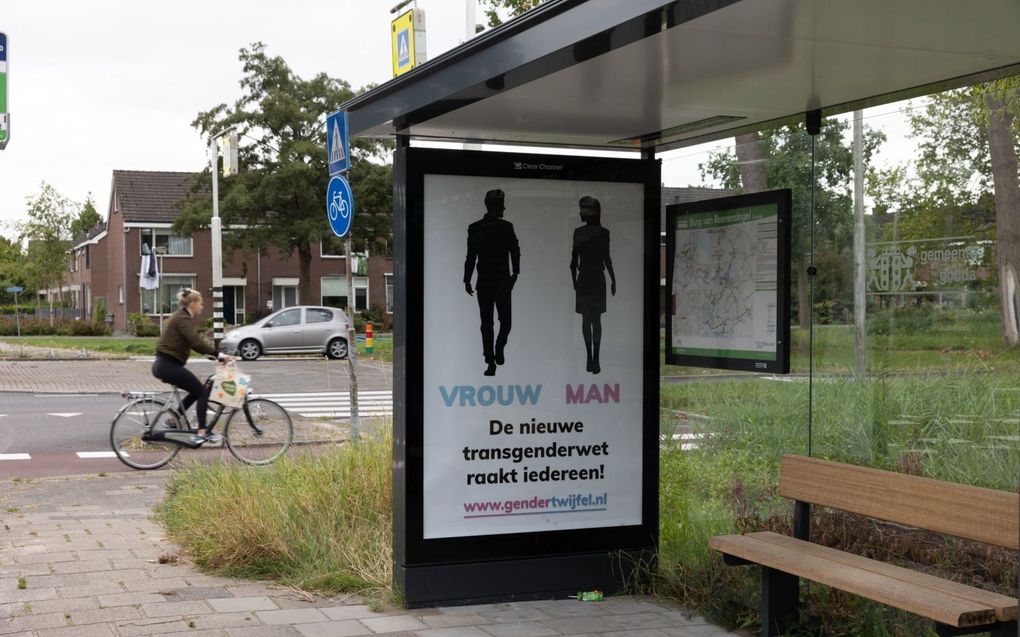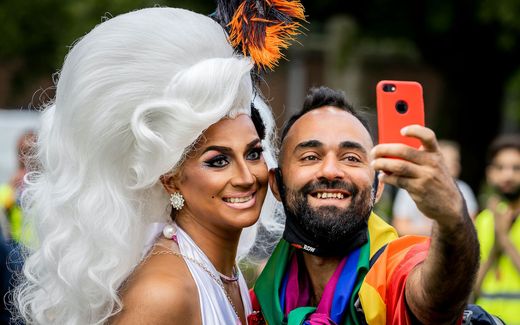New Dutch campaign warns society for new trans law

Photo Martin Droog
Western Europe
Large billboards decorate about 150 bus stations. “The new transgender law affects everybody”, the message reads. According to the people behind the billboards, the transgender law, which the Dutch parliament is discussing, pushes youngsters towards gender reassignment.
The campaign was started by Dutch people who are concerned about the new transgender law that is in the making. The new legislation should make it easier for people to change their legal gender. Even minors would be able to do so without the consent of their parents.
According to Bart Jan Spruyt, one of the people behind the billboards, the consequences of the trans law are “extensive”. He said so in an interview with the Dutch daily Reformatorisch Dagblad. “Every man can choose to become a woman, and vice versa.”
Yet, Spruyt finds it remarkable that almost no one talks about the new law. He notices that many political parties support the law from a progressive point of view, but a thorough debate is lacking. “That applies to politics, but also society and the media.”
The billboards in the bus stations are meant to start a debate in politics and the media. “Many people have no idea about this upcoming legislation”, Spruyt says. The poster includes a link to the website gendertwijfel.nl, which contains a manifest about the content of the new law and objections against it. “It must become clear that opposition does not only come from the ultra-conservative religious circles. We hope others also say: “This is crazy; we should not let this happen.”
Self-identification
The proposal seems well on its way to passing through the Dutch parliament, Reformatorisch Dagblad wrote. Although the Council of State, the highest advisory council of the government that looks at the legal side of every proposal, warned against it, there seems to be almost no debate on the issue.
The new law aims to regulate the conditions under which people can change their legal gender on their birth certificates. Since 2014, the person concerned needs to be over 16 years of age and has to provide a statement from a physician or psychologist to be able to do so. Soon, the Dutch Parliament will decide whether these conditions can be removed altogether.
If the proposal is passed, everyone over 16 can change their legal gender via a civil officer. Minors under 16 must send their request to the court, which will decide their case. However, the court does not need parental consent to permit them to change their gender. The law assumes that anyone who does not regret the decision within four to twelve weeks after his or her request to the civil officer has made a well-considered choice.
The Council of State has been critical of the transgender law. The advisory organ pointed out that experts of gender clinics warned that the age limit should not be removed because it prevents children from changing their gender without being able to think thoroughly about it. Yet, the Dutch Parliament seems to ignore the critical voices.
Law affects everyone
According to Bart Jan Spruyt, one of the people behind the bus station campaign against the new transgender law, the regulation affects everyone. Women will notice the consequences of the law because transgender women with male genitals can enter their restrooms and changing rooms. “That threatens their privacy and safety.”
In addition, parental authority is undermined because children will be able to change their gender against the will of their parents if the judge allows them to do so.
According to Spruyt, the new transgender law is especially dangerous because many adolescents who feel uncertain about their sexuality will overcome their struggles. He questions whether it is good to let them change their gender without advice from a physician or psychologist. Spruyt says that legal gender change is often followed by medical and surgical gender reassignment, even though these treatments have serious consequences such as infertility or sexual malfunctioning. “What if these youngsters regret their decision later on? This law normalises the free choice of sex and can even stimulate youngsters to take irreversible decisions.”
In between
One of the leading physicians in the field of gender reassignment is the Reformed Christian professor Martin den Heijer. He works for the academic hospital at the Free University in Amsterdam. The Nederlands Dagblad republished an interview with Den Heijer on Tuesday morning. The medical expert said in the interview that the distinction between men and women is not always black white. Den Heijer points out that there is a whole world between male and female. “What I find interesting”, he says, “is that Genesis 2 already makes clear that there is a kinship between male and female. The Bible shows that male or female is not a personal choice. Yet, it leaves space for biological and psychological similarities between the sexes. Theologically seen, it is not true that men are from Mars and women from Venus.”
According to Den Heijer, both male and female embryos grow in the same way, until the moment comes that they start developing male or female parts. However, in his work in the gender clinic, he sees, although rarely, different forms in between. “Do we tell them: Male and female He created them, so you don't belong to them? Of course not. Biologically seen, there are several possibilities in between, psychological as well.”
Yet, Den Heijer objects to the ideology of gender activists. “They say that sex and gender are completely separate. You choose your own gender. This idea should not be normalised.”
Related Articles






